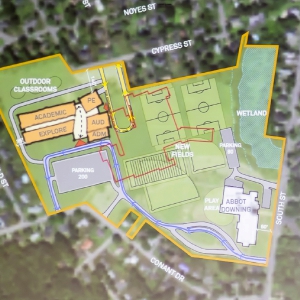Breaking down the NH budget – four categories to note as House and Senate send bills back to Sununu
| Published: 06-09-2023 4:46 PM |
A state budget is heading to Gov. Chris Sununu’s desk after a historic level of consensus in both the State Senate and House of Representatives.
It’s the first time both chambers have bypassed a Committee of Conference period where House and Senate members generally renegotiate provisions. The $15.2 billion biennial state budget passed on a voice vote in the House, while the trailer bill was approved on a 326-53 vote.
“I believe we kind of just made history,” said Speaker of the House Sherman Packard. “We just passed a bipartisan budget with probably the highest numbers we’ve ever seen.”
Here’s a breakdown of key elements of the budget, which trimmed $700 million from the House’s original proposal, with a focus on immigration, food insecurity, housing and care for children and seniors.
The creation of a Northern Border Alliance includes $1.4 million for overtime pay and training for law enforcement to increase patrols along the state’s Canadian border.
Senate approval for the border patrol came after the House voted to strip the funding from its version of the bill, with an amendment proposed by Rep. Alissandra Murray, a Manchester Democrat.
Murray, who immigrated to the United States and arrived in New Hampshire at age 5, argued that there was no data to prove that illegal border crossings were increasing along the 58-mile Canadian border and that providing more funding for patrol would harm immigrant communities.
“A program that allows our taxpayer money to pay police to roam unchecked on Northern properties, stopping and racial profiling whomever they want is enough to keep families like mine from feeling welcome in this state,” they said.
Article continues after...
Yesterday's Most Read Articles
 Hometown Heroes: Couple’s sunflower fields in Concord reconnects the community to farming
Hometown Heroes: Couple’s sunflower fields in Concord reconnects the community to farming
 Boscawen resident takes issue with proposed town flag designs
Boscawen resident takes issue with proposed town flag designs
 Skepticism turns to enthusiasm: Concord Police welcome new social worker
Skepticism turns to enthusiasm: Concord Police welcome new social worker
 With new plan for multi-language learners, Concord School District shifts support for New American students
With new plan for multi-language learners, Concord School District shifts support for New American students
 With Concord down to one movie theater, is there a future to cinema-going?
With Concord down to one movie theater, is there a future to cinema-going?
 Opinion: The Concord School Board can restore trust with residents
Opinion: The Concord School Board can restore trust with residents
After Senate Finance reinstated the program, Allison Palm was of many outside the Senate chambers Thursday in opposition. To her, the immigrant community in New Hampshire is a key part of the fabric of the state. The program will only send a detrimental message to this population.
“We have lots of immigrants in New Hampshire who are a vital part of the state. We want them to feel welcome," said Palm who is a minister for the Unitarian Universalist Church in Nashua. “The New Hampshire Border Alliance is the opposite of that.”
However, funding remained as state senators struck a last-minute deal to include a provision that requires police departments to provide 24 hours of public notice prior to an immigration checkpoint.
Senate President Jeb Bradley, a Wolfeboro Republican, introduced a late amendment as a compromise to Democrat concerns over immigration checkpoints along the border.
Now a notification of a checkpoint will have to be published on a government agency’s website.
After pandemic-era food assistance in school, where every child had access to free meals regardless of income, child hunger is now on the rise in New Hampshire, according to Sen. Becky Whitley, a Concord Democrat. This school year, families had to enroll their child in the free and reduced lunch program, which means that many who qualified, did not receive assistance.
In the House version of the state budget, children whose families qualify for Medicaid would be directly enrolled in the free and reduced lunch program.
Yet the Senate adopted a version of the budget that stripped this direct certification.
After the Senate Finance Committee eliminated the provision due to concerns over the cost of direct enrollment, Whitley proposed a pilot of the program in 10 towns in an amendment.
The 10 towns selected, which had the highest participation in the Supplemental Nutrition Assistance Program, included Franklin. This pilot would have increased access to food for more than 800 children, she said.
“We are talking about those folks who are our neediest, our children who are our neediest,” she said.
In recent years, there has been a rise in childhood hunger in the state, according to Whitley. And there are 6,000 children who qualify for free and reduced lunch but are not enrolled, she told senators.
The Senate rejected the amendment, with nearly 20 other proposals predominately from Democrats, before unanimously approving the budget Thursday night.
With an immediate shortage of 20,000 units in New Hampshire, the need to address the housing crisis in the state has been a common concern among state representatives.
The Senate version of the state budget supported provisions to address the need for housing, with funding for the state’s Affordable Housing Fund and the creation of the Housing Champions program.
The bill trimmed proposed funding for the Affordable Housing Fund from $30 million to $25 million. The fund, which is managed by New Hampshire Housing Finance Authority, has been a state tool since the 1980s to provide low-interest loans and promote the construction of affordable housing in the state.
But the Senate’s version of the budget included a new proposal, the Housing Champions Program, which set aside $5 million in funding for technical assistance from the state for municipalities. This means that the money could be used to help update master plans, and fund infrastructure programs like water, sewer or sidewalks.
For senators like Rebecca Perkins Kwoka, a Portsmouth Democrat, and Dan Innis, a Bedford Republican, housing has been at the forefront of their work in the State House this year.
“We’re really excited to set up this new program and see how we can use it to support our cities and towns in becoming partners in creating more housing, and especially housing that can be affordable to our next generation," said Perkins Kwoka.
In session Thursday, senators rejected an amendment that would have sent $3 million to the City of Laconia from the sale of the Laconia State School to help with infrastructure projects on the grounds.
The Executive Council approved a $21.5 million purchase and sale agreement for the former Laconia State School land in December. An amendment, from Tim Lang, a Sanbornton Republican, suggested providing the city with a portion of proceeds from the sale.
The land is set to be developed into 500 homes. The City of Laconia is looking for assistance for infrastructure development, like roads, water and sewer, on the land to support affordable housing.
“If I had a nickel for every time we talk about affordable housing in this body, I would be a rich man," said Lang.
Without the funding, the price of each home will rise as the developer will be responsible for the costs.
The amendment failed in the Senate, with Bradley suggesting it come forth as its own legislation next session instead.
The budget also includes provisions to support parents and seniors with increased Medicaid rates.
Originally introduced in the Senate this session, the budget included provisions from the “MOMnibus” bill, which was sponsored by Whitley.
The bill provided Medicaid coverage for maternal health services, like doulas, lactation services and reimbursements for breast milk donors.
The program also included funding for Family Resource Centers and food assistance for low-income women and children to shop at farmer’s markets.
State senators provided support for at-home health care with a $134 million increase in Medicaid reimbursement rates. This means seniors will have increased choices to age at home, if desired, said senators Bill Gannon, a Sandown Republican.
The trailer bill also expands the system of care for healthy aging with $1.7 million in funding.
For New Hampshire seniors, the support for aging in the trailer bill is like a popular game, with one word from Gannon to sum it up.
“BINGO.”


 Charities will not have to pay rent to casinos under new law
Charities will not have to pay rent to casinos under new law Sununu says he’ll support Trump even if he’s convicted
Sununu says he’ll support Trump even if he’s convicted NH mayors want more help from state on homelessness prevention funds
NH mayors want more help from state on homelessness prevention funds Two democrats with parallel views run for same State Senate seat
Two democrats with parallel views run for same State Senate seat
